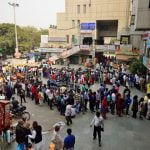 RBI met with members of the ATM and cash logistics industry to ensure smooth cash replenishment across the country. Photo: PTI
RBI met with members of the ATM and cash logistics industry to ensure smooth cash replenishment across the country. Photo: PTI
Mumbai: As India wakes up on Friday and lines up outside automated teller machines (ATMs) to refill its wallets with the much coveted Rs100 currency notes, it is important to note the work that went behind making this happen.
On Wednesday afternoon, nearly 20 hours after Prime Minister Narendra Modi announced that the government had decided to scrap Rs500 and Rs,000 currency notes in a bid to fight black money and terrorism funding, senior officials from the Reserve Bank of India (RBI) and the National Payments Council of India (NPCI) met with members of the ATM and cash logistics industry to discuss a strategy to ensure cash replenishment happens across the country and the machines don’t end up dispensing old high denomination notes.
The central bank officials were fresh out of a meeting with bank chiefs who had promised them that the situation at branches when banks reopened on Thursday would be taken care of. However, managing ATMs wasn’t in their hands.
The pressure, as members of that meeting figured, would be on the cash logistics industry which was responsible for transporting cash between the treasury and bank branches, between the banks and the ATMs and between banks and the large outlets that needed currency notes. It was decided that they would get time until Thursday to ensure that enough currency notes reached different parts of the country.
“The RBI had asked us to focus on three major duties in a specific order. The first was to ensure that enough Rs100 currency notes were being filled at ATMs across India. The second task was to ensure that the old high denomination notes were brought back to bank branches, so that they could be removed from circulation. The last duty was to push the new Rs500 and Rs2,000 currency notes,” said Anush Raghavan, vice-president operations, of SIPL, a CMS subsidiary which is India’s largest payment and cash management solutions company and the world’s fourth largest ATM cash management company. Raghavan was present at the meeting.
To make this happen, it was essential that the switches of all ATMs were reconfigured so that they dispensed only Rs100 currency notes, even if they had Rs500 and Rs1,000 notes filled in them.
The RBI’s focus was on moving Rs100 notes because removing Rs500 and Rs1,000 notes would take roughly a week and it would be counterproductive to make that the primary job, Raghavan said.
To fully appreciate these tasks, one must note that the cash logistics industry—with its nearly 9,000 cash vans and 30,000 employees—touches about 25,000 ATMs in a day. As of now, India has 2.2 lakh ATMs and the time given to these companies was less than 48 hours.
Another big challenge in this is to ensure that cash movement in high crime zones happens only during the day, since the police typically stops this movement at night in these places.
To achieve this, the Cash Logistics Association of India (CLAI), which is the industry body for these companies, had set up a control room to monitor all of these vehicles and receive hourly updates on the movement of cash, according to Rituraj Sinha, president, CLAI.
“We cancelled all the leaves of our employees during this period and have been working 24×7 to ensure that cash movement happens across locations. By Thursday evening, about 75% of the work was near completion. We expect that by midnight, it would be fully complete,” said Sinha.
The companies also decided that they would not hold the banks at ransom by demanding any additional charges due to the high frequency of cash movement.
However, it would not be possible for the industry to ensure that the machines are fully stocked through the day.
The cash holding capacity of these machines would be limited since they would have only Rs100 notes and the machines can hold only up to 8,000-10,000 currency notes. The number of notes is usually dependent on the average traffic that the machines see every day. However, the industry is expecting larger crowds across all machines on Friday.
[“Source-Livemint”]




